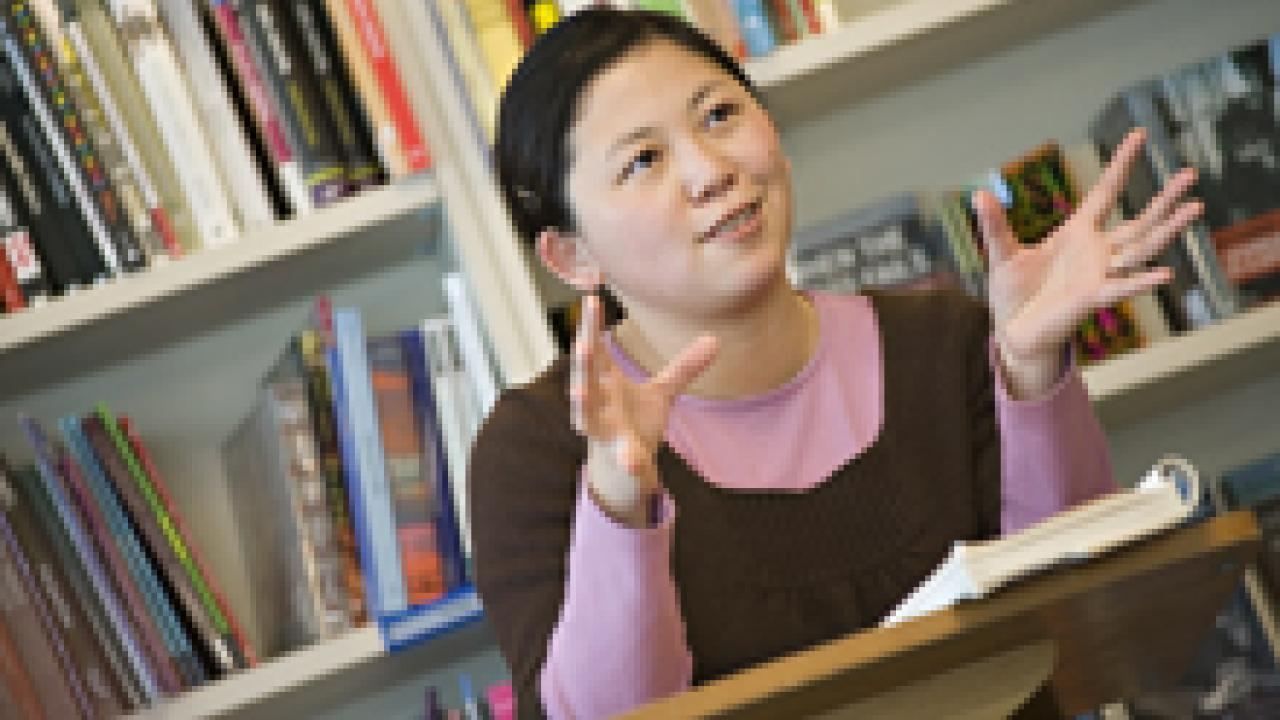In 1996, Yiyun Li came to the United States to become a scientist of immunology. Twelve years later, she is more at home with books than test tubes, a rising novelist gaining nationwide attention.
After completing an MFA in creative writing at top-ranked University of Iowa in 2005, she began her literary adventure as an assistant professor of English at UC Davis. All along the way, she wrote and wrote — Li’s essays and stories have been published in The New Yorker among other places, and she penned a book of short stories, A Thousand Years of Good Prayers. Her most recent book The Vagrants has received critical acclaim among top book reviewers.
“I came to America to become a scientist and somewhere along the way I just fell in love with writing,” Li said. “I realized that I loved writing more than I loved science, and that was why I switched my career.”
It has not always been easy for Li. Under U.S. immigration law, she had to prove she was an artist of “extraordinary ability” to stay in America. Her application was rejected twice, despite her literary success and letters of support from such writers as Salman Rushdie. Finally, in 2007 Li and her husband were granted green cards.
Li, who lives in Oakland, began teaching at UC Davis in fall 2008.
Stories written in English
Li’s stories are strictly fictional — she thoroughly enjoys developing the characters in her novel and molding their stories from her imagination.
“I love language and I love writing,” she said. “I’m fascinated by people, and I like to tell their stories and make up stories.”
Li does not write any of her stories in her native Chinese; she chooses instead to write exclusively in English. Li learned English in China, starting English lessons at age 12, and now prefers this language in her writing.
“I had never written creatively in Chinese, so when I began to write fiction, English became my first language in storytelling,” Li said.
Li grew up in Beijing. Not surprisingly, Chinese culture greatly influences her stories and her writing.
“Of course one’s culture influences one’s writing in all sorts of ways that can’t be explained,” she said.
Li writes about China in order to embed its own stories and culture into her own stories. Though Li’s stories are written in English her experiences in China have always provided her with creative inspiration, and it is her hope to maintain her Chinese heritage in her writing.
“I started writing just about China: people in China and certain situations in China,” Li added. “I also wrote about interesting situations I made up from the characters I created.”
Li’s first novel, The Vagrants, stays true to her theme of writing about situations in China. It is set in China during the Cultural Revolution of the late 1960s and early 1970s.
“The novel begins with an execution, and later on there is another execution,” Li said of her book. “The book is about the town it takes place in and how the community reacts to these public executions.”
When writing a story, she strives to retain “arc” and “scope.” She believes that the two portrayals of execution in The Vagrants provide an arc from one event to the other.
“The book is about community, and there are a lot of different characters for the reader to explore,” said Li.
Li recently gave a reading of her new novel at the UC Davis Memorial Union. There, Paul Takushi, the bookstore’s tradebook purchasing agent, introduced her and commented on the novel.
‘Lushness of the prose’
“I thought it was going to be very depressing and bleak,” Takushi said. “However, it was subtle. It really impressed me, the lushness of the prose.”
Li went on to explain how she created the characters in her novel, and how she tied the entire story together.
She described some characters in detail, including Bashi, who she claimed was her “nosy, snooping character.”
“It was Bashi’s belief that he needed to gain knowledge of a woman’s body before he could gain access to her heart,” Li read in describing Bashi’s personality.
Li noted that the readers of her novel generally regarded Bashi as creepy or strange.
Another challenge Li faced was tying together the vast number of characters with a common thread.
“Two of the main characters, the vagrants, a couple who I named the novel after, were the common thread,” Li said. “They told seven different stories and they were the hope of the novel.”
Barbara Fillon, Li’s publicist with Random House, said that while Li’s work is not autobiographical, her experiences have influenced her work and the stories that she creates.
“I think she’s a real artist,” Fillon said of Li. “Her art cannot be reduced to her experiences, but certainly her experiences have influenced her work.”
Currently, Li is working on another collection of short stories, and that is to be published by Random House next.
Li’s new book earned her a sterling review in the New York Times’ Sunday Book Review section on March 6.
“Li’s novel is not easy or enjoyable to read, but what it has to do and say is serious business, not unlike the business of counting the dead and burying the bodies,” wrote Pico Iyer, the reviewer and famed essayist who lives in Japan.
For more information on Yiyun Li, see www.yiyunli.com.
Caitlin Cobb is a Dateline intern.
Media Resources
Clifton B. Parker, Dateline, (530) 752-1932, cparker@ucdavis.edu
